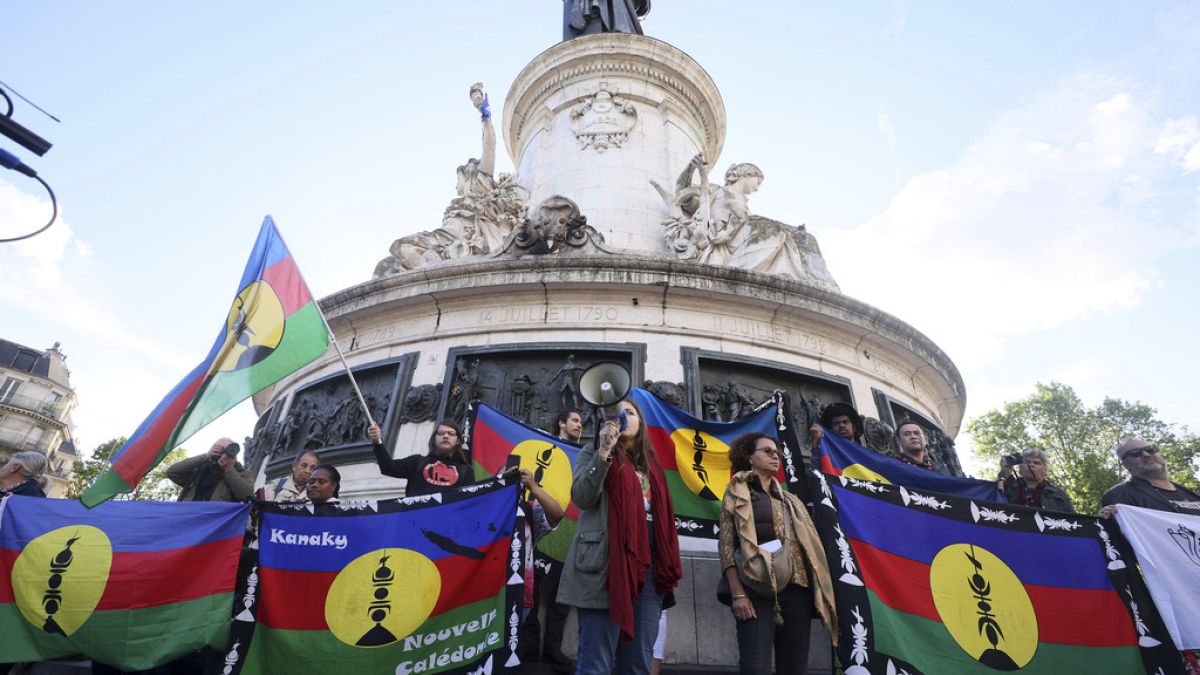Politics
Anger builds over sweeping change in the way most Californians will pay for electricity
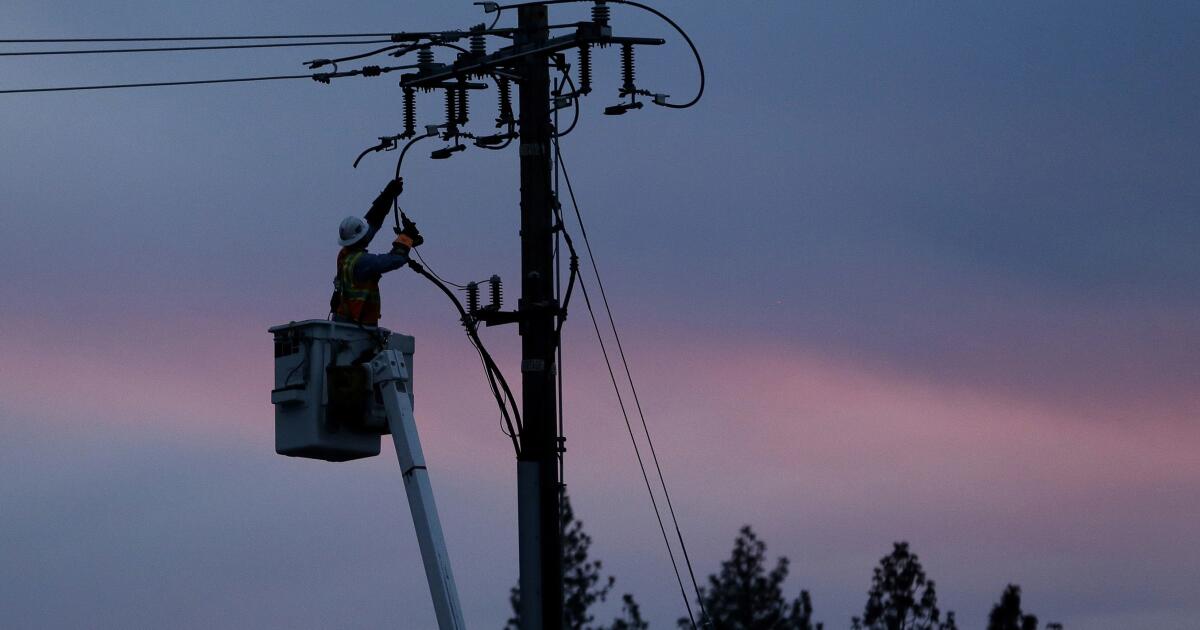
With little debate two years ago, state lawmakers passed a complex energy bill that enabled a sweeping change in how most Californians are billed for electricity.
The legislation was what Pacific Gas & Electric had asked for from the state public utilities commission three months before: a transformation of electric rates so that households would pay a fixed charge each month in exchange for lower rates for each kilowatt hour they used.
Gov. Gavin Newsom submitted the bill as part of a massive 2022 budget revision. In four days, it was passed out of an Assembly committee hearing without discussion, approved by the full Assembly and Senate and signed by Newsom.
The state’s three largest investor-owned power companies that pushed for the change say it will encourage Californians to ditch cars and appliances that run on planet-warming fossil fuels and replace them with vehicles, stoves and heaters that operate on electricity from solar panels and wind turbines. They also say the new monthly fee would allow them to more evenly allocate fixed costs among customers.
But opponents say the legislation was a financial gift to PG&E, Southern California Edison and San Diego Gas & Electric, and will cause millions of Californians who live in small homes or apartments that use little electricity to pay more, while residents in large homes that use a lot of electricity will save money.
“If you wanted to design a policy that would send the signal that conservation doesn’t count, this would be it,” said Ken Cook, president of the Environmental Working Group.
Now, as governor-appointed members of the California Public Utilities Commission prepare to approve a $24 monthly charge at a May 9 meeting, some lawmakers who voted for the original legislation are trying to reverse it. A coalition of more than 250 environmental and community groups are also protesting the law, claiming that its approval smacks of an all too cozy relationship between utility companies, regulators and think tank researchers.
Opponents complain that the new law eliminates a $10 cap on fixed charges that had been in place since 2013, and that there is now nothing to prevent the utilities from raising it higher and higher.
“There is a trend nationwide of utilities trying to move more of the payments they extract from ratepayers into fixed fees because they get that money no matter what,” said Cook. “This is easy money.”
Terrie Prosper, the CPUC’s director of strategic communications, said in a statement that the new rate structure “makes going electric more affordable for everyone, regardless of income, geography, or the size of their home.”
Someone who powers all their home appliances and their vehicle with electricity would save an average of $28 to $44 a month compared to the current billing structure, the commission estimates. (The law does not apply to the Los Angeles Department of Water and Power or other municipal utilities.)
Prosper said customers would still be encouraged to conserve electricity in the evening hours when the grid is most stressed because the rate per kilowatt hour would be higher. This is similar to how current rates vary by the time of day, she said.
“The flat-rate design will not increase utility revenues,” Prosper said. “The flat rate is not a new fee — it simply reallocates how electricity costs are paid for on bills.”
Alex Stack, a spokesperson for Newsom, said that before the bill’s passage, the idea of the fixed fees had been repeatedly discussed at public meetings and budget hearings “as a potential solution for managing rising electric bills.”
Stack did not answer a question of whether Newsom proposed the bill at the utilities’ request.
And Prosper did not explain why the Newsom administration had introduced the fixed-fee language in a bill just days before the governor had to sign the budget and related legislation.
Already California has the nation’s second-highest electricity rates. Only rates in Hawaii are higher.
Michael Backstrom, SoCal Edison’s vice president of regulatory affairs, said the new fixed charge would ensure “everyone using the grid is paying for its operation and upkeep.”
“There is no additional cost being collected,” he said. “There’s no change to utility profits.”
PG&E and SDGE executives did not respond to several phone calls and emails seeking comment.
The inspiration for the new law came from a 2021 paper written by professors at UC Berkeley’s Energy Institute at Haas, which is partly funded by utility companies.
The paper detailed how costs for building renewable energy plants, burying power lines to reduce the risk of wildfire ignitions and compensating fire victims have pushed electric rates so high that they were discouraging Californians from buying electric cars and replacing their gas appliances.
The paper also said the rising number of homes with solar panels meant that fewer households were paying for these fast-rising expenses that go into calculating the rate per kilowatt hour charged by utilities.
The professors proposed that the rate per kilowatt hour be reduced while a new fixed charge be added to bills.
Fixed fees are considered to be regressive, since they are harder for lower-income people to pay than the wealthy. For this reason the professors proposed a fixed charge that was progressive and rose according to income.
Since 2018, Berkeley’s Energy Institute at Haas has received $205,000 from PG&E, $160,000 from Edison and $50,000 from SDGE, according to the institute.
The Solar Rights Alliance — a nonprofit that advocates on behalf of homeowners and businesses that use solar power — said the institute’s work of advising the government while receiving money from the utilities “suggests a serious conflict of interest.”
Severin Borenstein, an economics professor who was the lead author, said no organization is allowed to give more than 2% of the institute’s budget. And he said the electric companies had no influence on the 2021 paper.
“We are not doing the bidding of any of these people,” he said.
The utility companies liked the paper’s recommendations. In a March 2022 filing, PG&E argued for “swift adoption” of a fixed charge similar to what the professors had proposed.The company said legislation was needed “to either raise or ideally eliminate” the $10 cap.
Two months later, on May 13, 2022, Newsom released a 175-page revision to his proposed budget. In a paragraph on Page 63, he said he was proposing legislation “to adjust electricity rates to predetermined fixed charges.” That change, he said, would “enhance widespread electrification efforts.”
The state’s legislative tracking system shows the proposed language to do that first appeared on June 26, 2022. That’s when a measure, Assembly Bill 205, was amended to add pages of proposed energy legislation. Part of the bill allowed the state to buy power from the aging Diablo Canyon nuclear plant and to approve solar and wind farms over the objections of local governments.
It also contained language that eliminated the $10 cap and ordered the utilities commission to establish a fixed charge on an “income-graduated basis.”
AB 205 was what is known in Sacramento as a trailer bill to the state budget. The trailer bills are meant to enact law changes required by the governor’s proposed budget. But politicians have sometimes misused them to get complicated or controversial legislation passed with little public notice.
Lawmakers’ use of the trailer bills surged after voters passed Proposition 25, pushed through by Democrats and public employee unions in 2010, which said the budget and any related legislation would need just a majority vote, rather than two-thirds. Democrats now dominate the state’s legislature.
When AB 205 was introduced, a Democratic lawmaker called it “a crappy trailer bill that was dumped on us on late Sunday night.”
The next day, AB 205 and 28 other trailer bills addressing issues ranging from cannabis regulation to reproductive rights, were presented at a hearing of the Assembly Budget Committee.
According to a transcript, the committee’s leaders limited public discussion to one hour. The fixed electric charge was not mentioned.
“Unfortunately, having this one hearing for one hour mere hours after budget bills materialized is certainly not adequate,” said Assemblymember Vince Fong, a Bakersfield Republican, at the hearing.
The full Assembly and Senate passed the bill two days later. Newsom signed it the next day.
Last year, the three electric companies said that in accordance with AB 205 they were proposing fees as high as $128 a month for households with incomes over $180,000. Those earning $69,000 to $180,000 would pay a fixed monthly fee of as much as $73. Those making less than $69,000 would pay $15 to $34, depending on which company supplied their power.
The three companies said they would seek to increase the fixed charge if there was a “revenue imbalance” of 10%. Such an imbalance might occur if estimates of how much they would collect in fixed charges did not cover what they were losing in the lowered rates per kilowatt hour.
The companies’ proposal outraged some legislators.
A letter to the commission from 18 Democratic members of Congress pointed out that the average electricity consumption of each California resident had stayed nearly flat since the 1970s because of energy efficiency efforts.
“Imposing a high fixed charge may undercut these decades of progress by forcing people to pay their utility company before they even turn on the light switch,” the California representatives wrote.
In January, Assemblymember Jacqui Irwin, Democrat from Thousand Oaks, proposed a bill named AB 1999 to reverse much of what Newsom’s bill had done.
With criticism growing in late March, the commission said it was proposing a more modest monthly fixed charge of $24.15. Lower-income people would pay either $6 or $12 a month based on their circumstances.
But the commission’s proposal did not stop the complaints from households across the state or the coalition opposed to the new rate structure.
In an analysis conducted for the coalition, Josh Plaisted of Flagstaff Research estimated that households using more than 6,000 kilowatt hours a year would save more as they increased their electricity use. For example, a 2,500-square-foot home with a swimming pool might save more than $300 a year, he said.
“I think this is a surprise to most people,” Plaisted said. “You have low energy users subsidizing current high energy usage.”
The opposition was angered even more when Speaker Robert Rivas (D-Hollister) and other Assembly leaders stopped debate on Irwin’s bill late last month with a procedural move that shelved it for the legislative session.
Cynthia Moreno, the speaker’s press secretary, disputed claims that the Assembly leaders had killed the bill.
“We are continuing work on the issue this year, including possible amendments to ensure any changes in the fixed charge are revenue neutral for utilities and not a means to increase their profits,” she said.
Moreno said that Rivas appreciated the “legislative scrutiny of the PUC and the governor’s plan, and that oversight will continue.”

Politics
Biden's 'privilege' claims sound like arguments Trump officials made before getting thrown in jail: attorney

President Biden’s assertion of executive privilege to prevent recordings of his interviews with special counsel Robert Hur from being released shares some similarities with former President Trump’s attempts to use privilege while in the White House, according to one legal expert.
Though transcripts of Biden’s interview with Hur have already been released to a committee, the White House asserted executive privilege to block the audio recordings from becoming public while arguing in lockstep with Attorney General Merrick Garland that “law enforcement files like these need to be protected.”
“The same arguments were made during the Trump years as are being made now. It’s just that the roles are reversed,” former Assistant U.S. Attorney Andrew McCarthy told Fox News Digital.
“For example, during the Mueller investigation, Trump made available Don McGahn, who was the White House counsel. They not only let Mueller interview McGahn at length, but McGahn took voluminous notes of his conversations with Trump, which they also turned over. And then Democrats wanted to subpoena McGahn to come to the House Judiciary Committee, and the Republicans fought it.
BIDEN’S PRIVILEGE CLAIM TO KEEP SPECIAL COUNSEL INTERVIEW UNDER WRAPS A ‘CRUDE POLITICS’ MOVE: EXPERTS
President Biden speaks at the National Museum of African American History and Culture in Washington, D.C., May 17, 2024. (Al Drago/Bloomberg via Getty Images)
“What they said was giving information to an executive branch prosecutor doesn’t waive the privilege as to Congress,” he added. “The Democrats all said that this was an obstruction of justice, that it was outrageous, that he’d already waived the privilege by allowing McGhan to speak to the prosecutor.”
Executive privilege has been around since the earliest days of the country and gives the executive branch the ability to withhold certain internal discussions and documents from scrutiny by the courts and the legislative branch. It allows the president some breathing room for his own deliberations with staff.
“The fact is that since the Republic started, presidents have been withholding information from Congress,” McCarthy said.
Congress has a variety of tools it can use to pry information out of the executive branch, including by holding people in contempt.
“Congress has a whole arsenal of stuff from the Constitution, powers that it can use to fight back and pry information out of the executive branch,” McCarthy said. “You know, you can slash budgets or hold up appointments, and if it gets bad enough, you can start holding people in contempt. … The final option, obviously, is impeachment.”
McCarthy warned, however, that if the president’s party has enough influence in Congress, those efforts can be more challenging.
“If the president’s party has enough sway in Congress that you can stop that arsenal from being used, then the whole thing is just a political calculation,” he said. “Like for Biden here, it’s how much worse would I be hurt by letting the tape come out or the recording come out than by stonewalling. It looks like the tape is so bad, he’s decided that even though he’s going to be damaged by stonewalling, that’s better than letting the tape out.”
McCarthy also highlighted how the media has reacted to Biden’s assertion of executive privilege, saying they’ll report on the matter in an attempt to preserve their integrity and then move on from it to “help Biden bury it.”
“The usual problem that you always have here is that when Republican administrations stonewall, the media gets all whipped up about it, and when Democratic administrations stonewall, they feel like they have to cover it for a day or two so that they can say they covered it but then move on to another subject and help Biden bury it, or at least they’ll try,” he said.

Former President Trump, left, and President Biden (Associated Press )
Garland on Thursday defended Biden’s decision to assert executive privilege, saying the subpoena for audio recordings “is one that would harm our ability in the future to successfully pursue sensitive investigations.”
“There have been a series of unprecedented, frankly, unfounded attacks on the Justice Department. This request, this effort to use contempt as a method of obtaining our sensitive law enforcement files is just the most recent effort to threaten, defund our investigations, and the way in which there are contributions to an atmosphere that puts our agents and our prosecutors at risk,” he added.
“It is the longstanding position of the executive branch held by administrations of both parties that an official who asserts the President’s claim of executive privilege cannot be prosecuted for criminal contempt of Congress,” Associate Attorney General Carlos Uriarte wrote in a letter Thursday to GOP Reps. Jim Jordan and James Comer, chairmen of the Committee on the Judiciary and Committee on Oversight and Accountability, respectively.
That “longstanding position,” however, was challenged following Trump’s term in the White House and the Capitol protests Jan. 6, 2021.
Two individuals who served in the Trump administration and raised executive privilege claims — former White House chief strategist Steve Bannon and former Trump adviser Peter Navarro – have been convicted of contempt of Congress and sentenced to serve jail time for their refusal to comply with subpoenas issued by the now-defunct House select committee investigating the Capitol protests.
TRUMP ALLY STEVE BANNON LOSES APPEAL ON CONTEMPT CONVICTION AS HE FIGHTS TO STAY OUT OF PRISON
Bannon, 70, was sentenced to four months in prison in October 2022 and a $6,500 fine for ignoring a congressional subpoena.
Bannon’s appeal was denied last week after the U.S. Court of Appeals for the D.C. Circuit released a 20-page opinion that said granting Bannon’s appeal would “hamstring Congress’s investigatory authority.”
Bannon claimed he acted on the advice of his legal team and did not intend to break the law. Judge Bradley Garcia wrote the acting on “advice of counsel” defense is “no defense at all.”
The ruling will be appealed, Bannon’s attorney, David Schoen, told Fox News Digital last week.
Schoen noted that Bannon’s attorney at the time he received the subpoena, Robert Costello, advised his client that he was not permitted, as a matter of law, in any way to respond to the notice, saying executive privilege had been raised and that it was not his privilege to waive it. Costello wrote the committee to inform it that Bannon would comply if the panel worked out any privilege issues with former President Trump or if a court ordered him to comply, Schoen said.

Former White House chief strategist Steve Bannon, left, and former Trump adviser Peter Navarro (Getty Images)
Similarly, Navarro, who reported to prison in Miami in March following an order from the U.S. Supreme Court, was charged and convicted with contempt of Congress after he refused to comply with a congressional subpoena demanding his testimony and documents relating to the events of Jan. 6.
Though Navarro is attempting to appeal his contempt of Congress conviction, the court refused to postpone his imprisonment until after the appeal is concluded.
Navarro claimed he could not cooperate with the committee investigating the Jan. 6 attack because Trump had invoked executive privilege, an argument that lower courts have rejected.
The lower courts found that Navarro could not actually prove Trump had invoked executive privilege.
Biden’s decision to assert the privilege, according to White House press secretary Karine Jean-Pierre, came at the request of Garland. Jean-Pierre said it was Garland’s suggestion that “law enforcement files like these need to be protected.”
The House Judiciary Committee on Thursday advanced a resolution to hold Garland in contempt of Congress over the Justice Department’s failure to produce the subpoenaed audio recording of Biden’s interview with Hur. The vote advances the measure for a full floor vote.
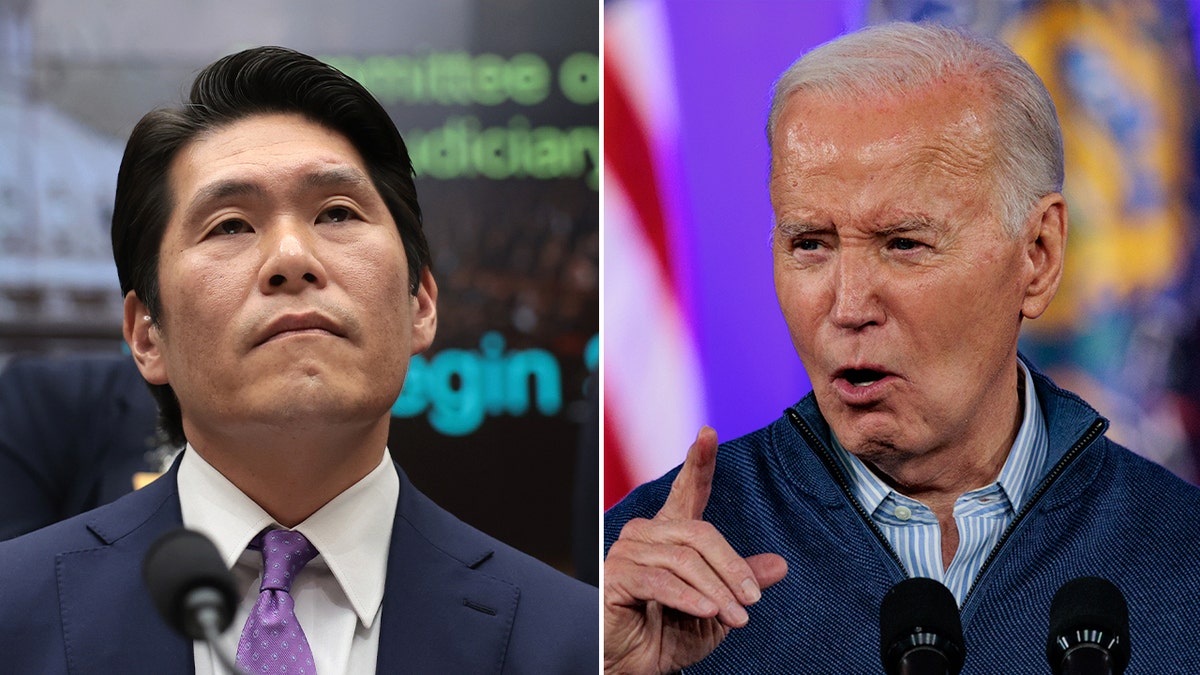
Special Counsel Robert Hur, left, and President Biden (Getty Images)
Hur led the investigation into Biden’s handling of classified documents after his departure as vice president under the Obama administration. Hur announced in February that he would not recommend criminal charges against Biden for possessing classified materials after his vice presidency, saying Biden is “a sympathetic, well-meaning, elderly man with a poor memory.”
Hur wrote in the report that “it would be difficult” to convince a jury to convict Biden of any willful crime, citing his advanced age.
The findings sparked widespread outrage that Biden was effectively deemed too cognitively impaired to be charged with a crime but could serve as president. Trump has meanwhile slammed the disparity in charges as a reflection of a “sick and corrupt, two-tiered system of justice in our country.“
Fox News’ Chris Pandolfo, Elizabeth Elkind, Louis Casiano and Emma Colton contributed to this report.
Politics
Column: Don't cancel those summer plans yet. Who knows if the presidential debates will come off
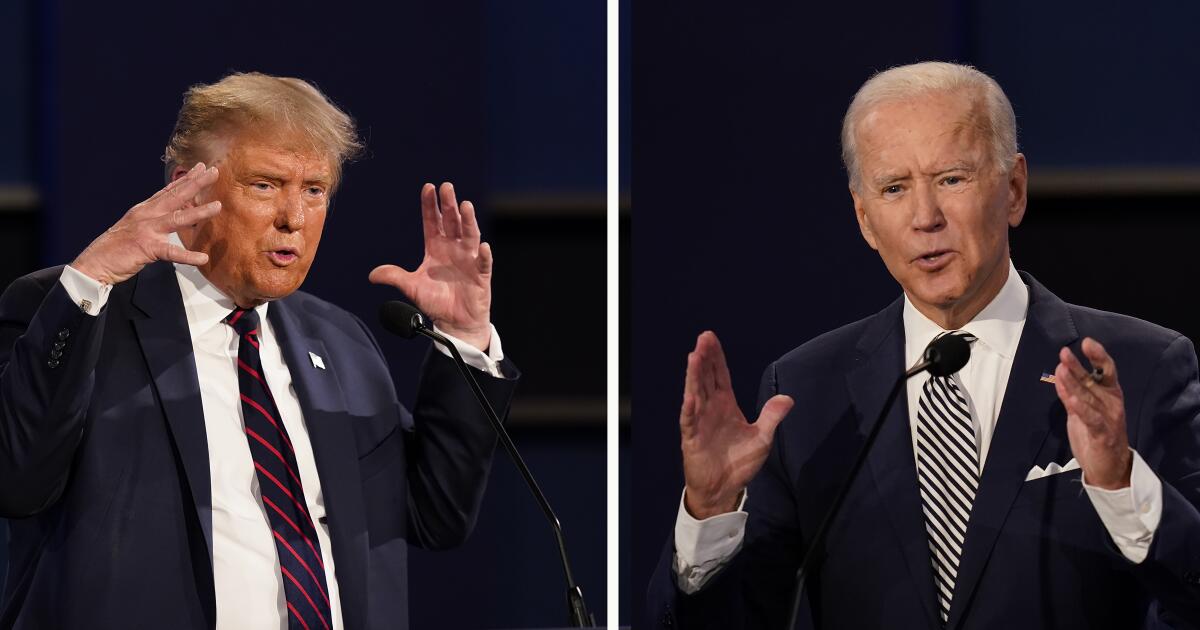
Today we discuss travel, leisure, sunsets and presidential debates.
Goody! Looks like we’ll have two Biden-Trump debates to tide us over this summer.
It seems that way. But who knows.
Wait. I shouldn’t cancel my dream vacation just yet?
I wouldn’t.
I mean, I don’t want to pop your party balloon. If a political debate is your idea of a good time — rather than, say, sitting on the sugary sands of some beach watching a dappled sunset play on the water, more power to you!
But we’re still a long way from the moment President Biden and former President Trump share a debate stage.
I thought it was all settled.
The prospective debates did come together rather quickly after Biden issued a taunting challenge and Trump immediately agreed to two face-to-face meetings.
The first is scheduled for June 27 on CNN. The second is set for Sept. 10 on ABC.
However, there are still a lot of details to be worked out, and plenty of opportunity for one party or the other to walk away.
Remember, in 2020 Trump bailed on a debate with Biden because the terms — a remote set-up, taken as a precaution during the COVID-19 pandemic — weren’t to his liking.
I thought all the details were ironed out by an independent debate commission.
That’s how it used to work.
Starting in 1987, the Commission on Presidential Debates — a nonprofit entity with a bipartisan board of directors — worked with the television networks to set up three presidential and one vice presidential debate each election cycle.
Matters such as the format, the choice of moderators and the seating (or standing) arrangements were settled ahead of time.
All the candidates had to do, apart from cramming for the 90-minute sessions, was show up.
So what happened?
The commission laid out its plans for four debates this fall, starting on Sept. 16 and ending on Oct. 9. But Biden and Trump chose to disregard the commission and ignore its proposed schedule.
They can do that?
Yes, indeed. There’s absolutely no requirement the candidates abide by the commission’s recommendations, or debate at all.
Jeepers.
Actually, the move wasn’t all that startling.
Trump was unhappy with the commission for several reasons. He complained about the moderators chosen in 2016 and again in 2020. He also didn’t like a decision to mute candidates’ microphones during parts of the second 2020 debate after he persistently talked over Biden in their first meeting.
Two years ago, at Trump’s behest, the Republican National Committee officially withdrew from the debate commission.
So Trump blew it up.
No. Biden had issues with the commission as well.
Two of his top political advisors, Anita Dunn and Ron Klain, were part of a bipartisan panel that issued a 2015 report calling for an overhaul of the presidential debate process by, among other things, expanding the pool of potential moderators and eliminating on-site audiences.
The bottom line is both campaigns thought it better suited their interests to bail on the commission and work out a debate schedule by themselves.
So it’s a win-win for Biden and Trump?
You could look at it that way.
Biden doubtless would have preferred to come nowhere near Trump. If he was running away with the contest, the president might have gotten his wish.
But debates have come to be expected of the two major party candidates, and if Biden refused it would have invited further unwanted questions about his health and stamina.
By agreeing to two debates, and no more, Biden limits the risks of a campaign-jeopardizing stumble. Also, by holding the debates earlier than usual — the last takes place nearly two months before election day — it allows the president plenty of time to recover politically if he turns in a less than stellar performance.
That said, Biden could be boffo — or at least perform decently enough. He’s shown a penchant for rising to important occasions, such as his well-received State of the Union speech in March.
What’s in it for Trump?
He’s been salivating to get onstage with Biden, repeatedly saying he’d debate the president anytime, anywhere. So Trump couldn’t very well refuse when Biden replied, OK, let’s do it.
More than that, Trump and his strategists are thoroughly convinced that Biden is a walking, or rather, doddering disaster. In fact, while it’s typical for a candidate to downplay expectations — the better to crow about their performance once the debate is over — Trump has done the opposite.
He’s described Biden as “the WORST debater I have ever faced” and a man who can’t “put two sentences together.”
So if he puts two sentences together, Biden wins?
I wouldn’t say so.
It doesn’t matter how high, or low, Biden or Trump set expectations. Voters can watch and judge their performances independent of any pre-debate spin. That’s why tens of millions of people tune in. The debates offer one of the few occasions during a campaign where the candidates can be seen unscripted and thinking and acting on their feet.
What about other candidates?
Trump and Biden would both be happy to exclude Robert F. Kennedy Jr., the leading independent candidate, since neither side is certain whom he helps or hurts more.
Regardless of how Kennedy performed, standing on the same stage as Biden and Trump would automatically elevate his candidacy.
That’s another reason the two major party candidates agreed to their own arrangements — though Kennedy could still qualify under the criteria put forth by CNN and ABC. His participation is among the open questions surrounding the debates and something that could end up nixing one or both.
So should I stick with or cancel my summer plans?
Go ahead. Get out there and see the world. It’s summertime!
If you’re that concerned about missing the political action, just make sure your cabana or mountain aerie has reliable Wi-Fi.
Politics
Experts reveal major 'downside' to potential Trump VP pick: 'No wow factor'
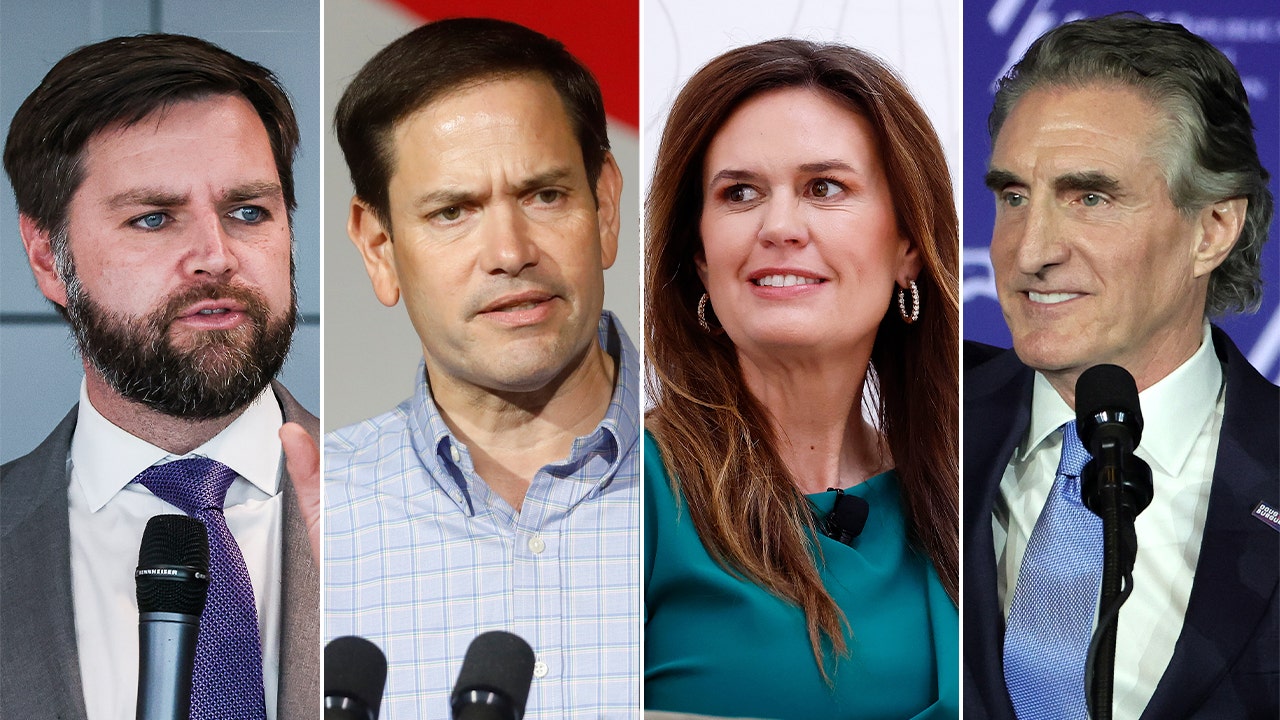
Editor’s note: This is the second in a series of profiles of potential running mates for presidential candidate Donald Trump on the 2024 Republican Party ticket.
A possible frontrunner on former President Trump’s running mate shortlist has a major “downside” that could make his potential selection a bad bet, multiple campaign and election experts told Fox News Digital.
The horse race among those hoping to be named Trump’s running mate continued this week. Those widely believed to be on the shortlist made the rounds on various media outlets and at events alongside the former president, including North Dakota Gov. Doug Burgum, who some say lacks a “wow factor.”
“He’s not a known commodity. He’s not somebody that, I think, instinctively would fire up the base or fire up Republicans,” GOP strategist Dave Polyansky said, citing concerns over Burgum’s lack of name recognition despite running in the Republican presidential primaries last year.
TRUMP VEEP STAKES: THE PROS AND CONS OF SOUTH DAKOTA GOV. KRISTI NOEM
From left to right: Ohio Sen. JD Vance, Florida Sen. Marco Rubio, Arkansas Gov. Sarah Sanders and North Dakota Gov. Doug Burgum. (Getty Images)
He argued that, although firing up the base wasn’t the main purpose in a choice for running mate, there was no “overwhelming cry” from Republicans across the country for Burgum to be the pick.
“Again, that shouldn’t necessarily be a decider, but there’s no wow factor to him,” Polyansky said.
Veteran Republican strategist Karl Rove agreed Burgum’s name recognition was also a problem and that he’s “from a small, heavily Republican state” when the battle for the presidency could come down to who wins over voters in the battlegrounds of Arizona, Michigan, Pennsylvania, Nevada and Wisconsin.
Rove also predicted Burgum’s wealth could “make him a target for the left.”
WATCH: POSSIBLE TRUMP VP PICK MAKES MAJOR PREDICTION ABOUT BLACK VOTERS AS BIDEN BLEEDS SUPPORT
Republican strategist Erin Perrine told Fox “the downsides to Burgum’s selection are not deeply controversial given other possible selections the former president could make” but agreed with Rove that Burgum hailing from a reliably red state with a small population wouldn’t impact the electoral map.
“Some might argue that other potential candidates could bring more expertise, higher visibility or diversity to the ticket, leading to doubts about Burgum’s suitability as a VP nominee,” she said. She added Burgum declaring last year he wouldn’t serve as Trump’s running mate, as well as the possibility he might face intensified media scrutiny regarding his absence from North Dakota over the past year, would likely complicate his selection.
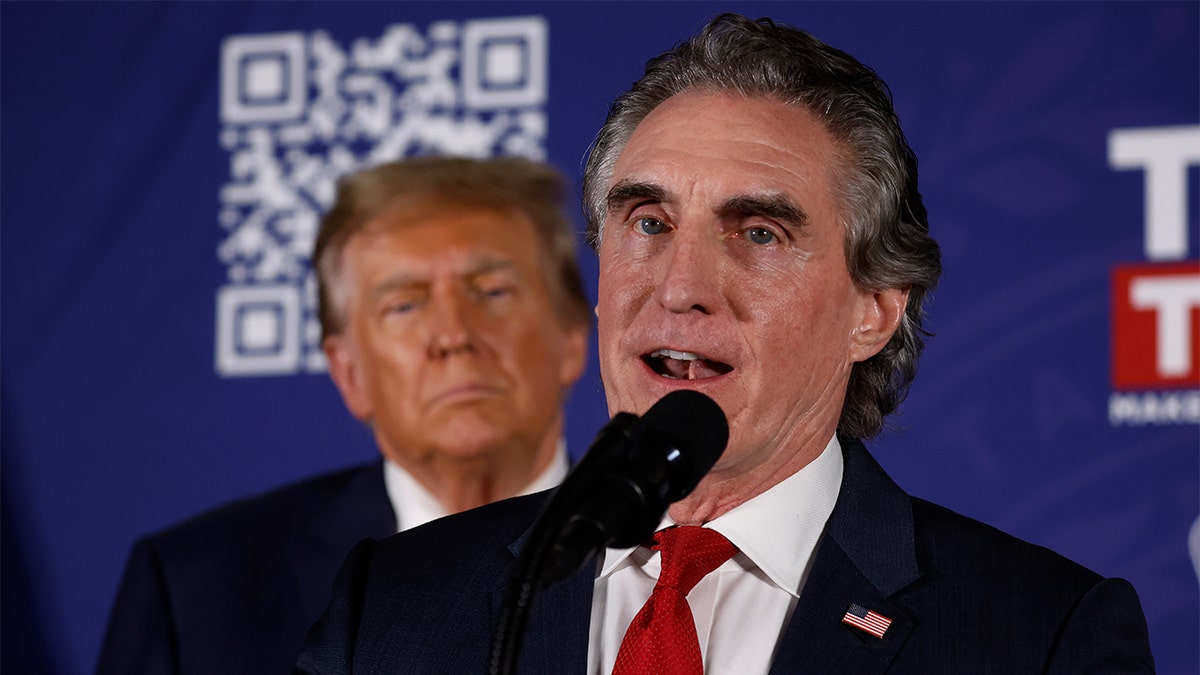
North Dakota Governor Doug Burgum encourages voters to support Republican presidential candidate and former President Trump during a campaign rally in the basement ballroom of The Margate Resort Jan. 22, 2024, in Laconia, N.H. (Chip Somodevilla/Getty Images)
“It doesn’t take much for the media to pounce, and campaigning as a sitting governor has proven difficult for others running for other offices before,” she said.
Others were more blunt when it came to the possibility of Burgum’s selection, including a source close to the Trump campaign who said there was “more downside than upside there,” citing the concerns over his name recognition and being from North Dakota.
“If I had to rank him, I’d put him in the top five, maybe five or six, but not any higher,” the source said.
GOP pollster Scott Rasmussen simply told Fox, “I see no reason why Gov. Burgum should even be in the discussion other than media speculation. The fact that Trump featured him at the recent rally is interesting, but I suspect the governor will play some other role in the campaign.”
Burgum, despite those concerns, does have a number of strong qualities experts said could provide a boost to Trump, including his record as the chief executive of a state and as a business leader.
TRUMP’S POTENTIAL RUNNING MATES TO COMPETE FOR APPROVAL AT MAJOR CHRISTIAN CONFERENCE AS SPECULATION SWIRLS
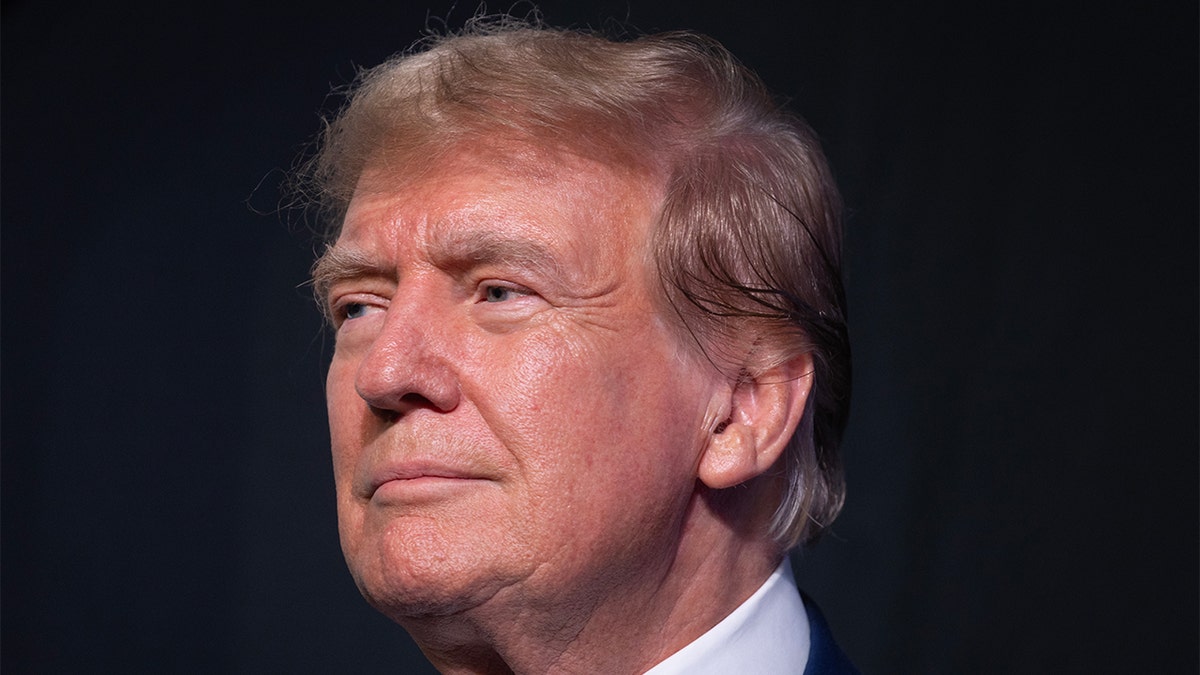
Former President Trump, a Republican presidential candidate, attends the annual Lincoln Reagan Dinner hosted by the Minnesota Republican Party May 17, 2024, in St. Paul, Minn. (Scott Olson/Getty Images)
“Burgum is a successful two-term governor of a major energy- and agricultural-producing state who’s championed education reform, tax cuts and government reform,” Rove said. “He’s also built a tech company — Great Plains Software — in the Midwest heartland, which he sold to Microsoft, becoming a top executive with the company before entering politics.”
Polyansky said one of the most “compelling” reasons to have Burgum’s name on the ticket was because of his television presence.
“He’s proven himself over the last month to be a great, very agile and pretty effective communicator,” he said. “Burgum’s shown that he can do some good in terms of his ability to communicate and drive a message.”
Perrine said Burgum’s “no-drama, no-nonsense demeanor has boosted the economy and safety of North Dakota,” and that being a “businessman-turned-governor” was “a mirror to Trump that the former president would appreciate.”
The source close to Trump’s campaign praised the governor as “a vote getter.”
“He’s a decent man,” the source said.

From left to right: House GOP Conference Chair Elise Stefanik, Virginia Gov. Glenn Youngkin, South Dakota Gov. Kristi Noem and U.S. Sen. Tim Scott of South Carolina. All have been floated as possible vice presidential running mates for former President Trump. (Getty Images)
A number of other big names have also been floated to join Trump on the Republican ticket, including South Carolina Sen. Tim Scott, Arkansas Gov. Sarah Sanders, Virginia Gov. Glenn Youngkin, House GOP Conference Chair Elise Stefanik, South Dakota Gov. Kristi Noem, Ohio Sen. JD Vance and Florida Sen. Marco Rubio.
Trump, who spent most of his week sitting on trial in a New York City courtroom while President Biden and Vice President Kamala Harris are free to hit the campaign trail, is still weighing his running mate options. He suggested last week he might even wait until the July Republican National Convention in Milwaukee to name his pick.
Fox News Digital has reached out to representatives of Burgum for comment.
Get the latest updates from the 2024 campaign trail, exclusive interviews and more at our Fox News Digital election hub.
-

 World1 week ago
World1 week agoUkraine’s Zelenskyy fires head of state guard over assassination plot
-

 Politics1 week ago
Politics1 week agoFox News Politics: No calm after the Stormy
-

 World1 week ago
World1 week agoIndia Lok Sabha election 2024 Phase 4: Who votes and what’s at stake?
-

 News1 week ago
News1 week agoSkeletal remains found almost 40 years ago identified as woman who disappeared in 1968
-

 Politics1 week ago
Politics1 week agoUS Border Patrol agents come under fire in 'use of force' while working southern border
-

 Politics1 week ago
Politics1 week agoTales from the trail: The blue states Trump eyes to turn red in November
-

 World1 week ago
World1 week agoBorrell: Spain, Ireland and others could recognise Palestine on 21 May
-

 World1 week ago
World1 week agoCatalans vote in crucial regional election for the separatist movement












